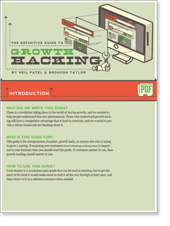
Why Your SaaS Company Needs a Growth Hacker
August 19, 2015
If you're still new to the term "growth hacker" or "growth hacking", don't worry. Many companies aren't sure what it is or what it means, but after a bit of research, you will find that it is necessary role at a SaaS company.
Sean Ellis invented the term “growth hacker” in 2010 in his seminal blog post, Find a Growth Hacker for Your Startup. Sean has had a successful career marketing start-ups such as Dropbox, LogMeIn, and Eventbrite, and wanted to coin a phrase for what he was able to do (and how). Thus, “growth hacking” was born.
So what is a Growth Hacker?
So what is the definition and how is it different than marketing? In Sean’s post, he explains:
“Generally speaking, the job requirements/skills [of a VP Marketing - such as establishing a strategic marketing plan and managing a marketing team] are not paramount for startups in or before the early growth phase.
“After product-market fit and an efficient conversion process, the next critical step is finding scalable, repeatable and sustainable ways to grow the business. If you can’t do this, nothing else really matters. So rather than hiring a VP Marketing with all of the previously mentioned prerequisites, I recommend hiring or appointing a growth hacker…
“A growth hacker is a person whose true north is growth. Everything they do is scrutinized by its potential impact on scalable growth…
“The right growth hacker will have a burning desire to connect your target market with your must have solution. They must have the creativity to figure out unique ways of driving growth in addition to testing/evolving the techniques proven by other companies.”
Growth hackers are driven by finding unconventional ways to get the word out about their business and connecting the target market with his or her product. While this pursuit does involve marketing techniques, it can also include product development as well as anything that might push adoption forward.
Take the classic example of Airbnb, the service where people can rent out rooms and/or entire houses from other people. In the beginning, Airbnb connected with Craigslist so that rental notices were automatically posted there as well. By tapping into an existing audience, Airbnb was able to grow their number of users, increase adoption of their website, and become a resounding success (according to the Airbnb website, it now has had over 25 million guests stay at rentals through their service).
So is a growth hacker really just a marketer?

Growth hacking is the idea of continually experimenting in new and unchartered ways to influence growth in a start-up. QuickSprout released an ebook by Neil Patel and Bronson Taylor called The Definitive Guide to Growth Hacking in which they clarify the difference between a “growth hacker” and a “marketer”:
“A growth hacker is not a replacement for a marketer. A growth hacker is not better than marketer. A growth hacker is just different than a marketer… Growth is the sun that a growth hacker revolves around… The power of a growth hacker is in their obsessive focus on a singular goal. By ignoring almost everything, they can achieve the one task that matters most early on.”
So why does your SaaS company need a growth hacker?
Any start-up company could make use of a growth hacker, but why does hiring one particularly make sense for a SaaS company? Four reasons…
SaaS companies are non-traditional by definition
I remember the very first time we hooked our family computer up to the Internet. First we had to move the mammoth of a computer to our kitchen counter so that it was next to the phone outlet. Then we had to install AOL from a CD and enter my mom’s credit card for our free trial. Then wait – pshhhhkrrr – whirl – whirl – ding – ding – ding. Wow, that makes me feel old.
I was in grade school at the time, but I never could have imagined that some day not only would the Internet be ridiculously fast and that no wires or phone lines would be required, but that even software would be accessible via the Internet.
While SaaS is popular for some types of software (such as CRM), it is still a firm minority with only 13% of software spending worldwide being used on SaaS applications.
This “non-traditional” mentality puts SaaS companies in exactly the right mindset to consider non-traditional marketing and product strategies that a growth hacker might suggest.
SaaS products have growth hacking opportunities built in
There are a lot of ways to “growth hack” your company. But all of the methods are about creating something that goes viral. And “viral” today means the Internet is part of the equation (usually).
With SaaS products, this type of connectivity can literally be built into your product. For example, a newsfeed stream tells your customers what’s going on. A bulletin board inside your product allows for a community to develop. Gamification can be incorporated and results reflected live. Back links to your website may help spread the word. And, of course, looking again at the AirBNB example, hooking up with another online software or service can help you tap into an existing audience with ease.
Success early on is critical for SaaS providers
SaaS companies are 40% more likely to go out of business than traditional software companies and 80% of start-ups fail within the first 18 months, so cash flow as soon as possible is vital. While you could hire a whole bunch of expensive salespeople, trying out a growth hacker may be a more effective approach to getting some early wins and sales. This, in turn, will allow new SaaS companies a bit of breathing room as they ramp up.
SaaS companies can grow exponentially without (very many) constraints
There are many constraints in business (the CEO of one of my past companies was a huge believer in Theory of Constraints, so we had to read a lot about it). For a manufacturing plant, you can only produce as many widgets as your slowest machine can turn out – thus, that machine is your constraint. In a service business (such as tax professionals), staff is a constraint as you can only take in as many clients as you have employees to manage their business.
For SaaS companies, though, the product is already built and you can sell exponentially more seats without having to increase staff or buy more manufacturing machines. Depending on your deployment, you probably wouldn’t need more servers either. The only constraint to selling your software like mad is making sure there are enough people in customer service to answer any problems/questions/bugs that come in!
Point being that a growth hacker could go to town without the limitations other types of business models might bring, knowing that they could succeed and the business would flourish.
---
Do you have growth hack suggestions that would work especially well for SaaS companies? We'd love to hear them!

About the author
Jessica Vionas-Singer was formerly the Senior Director of Client Success at SmartBug Media where she lead a team of SmartBugs who focus on HubSpot onboarding for clients new to the system and other project-based work, oversaw new employee onboarding, and rolled out new process and procedures within the Client Services department. She fell in love with marketing at her first job at a technology company specializing in credit evaluation software. Her background includes more than 20 years of marketing experience in content creation and lead-driving tactics, online presence and blog creation, social media engagement, budgeting and project plans, webinar and trade show event management, public relations, comprehensive promotional campaigns, and analytics. Jessica has a BS in Sociology from Montana State University – Bozeman. Read more articles by Jessica Vionas-Singer.






